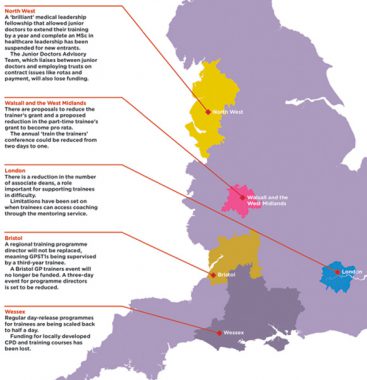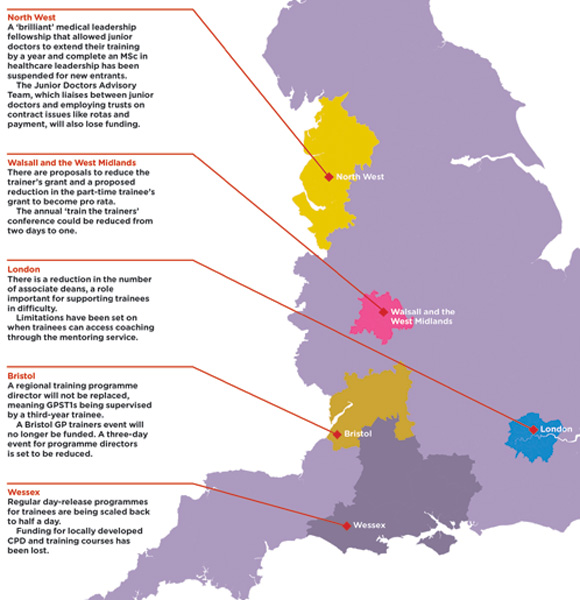Revealed: How GP training budget cuts are beginning to bite

The Government may be reconsidering austerity after a poor election result, but most health bodies are still having to tighten their purse strings.
This includes those charged with training the next generation of GPs. Health Education England has been told to find savings of 30% in its running costs.
HEE and the Government claim that this will not affect frontline training.
But Pulse has learned that, across England, training is being directly affected, with gold-standard mentoring and CPD development schemes being cut in a race to the bottom.
Shockingly, in one area, final-year trainees have been asked to run training courses because programme directors who leave are not being replaced.
But while being forced to cut educational support, HEE is still required to push on with new workforce initiatives, like developing the controversial nurse and physician associate roles.
And GP education experts warn these cuts are just the beginning, and they could heap even more pressure on struggling trainees.
The cuts were first laid out in George Osborne’s final spending review as chancellor back in November 2015, and required overall cuts to administration costs of all arms-length bodies.
The majority of HEE’s £4.7bn budget for 2017/18 goes on trainee salaries, bursaries and training costs, which are largely contractually fixed. But the budgets for administrative costs and ‘education support’ are being targeted for cuts of 30% – or around £40m.
Back in February Pulse revealed concerns that swingeing budget cuts could undermine GP training. The first sign of this came when GP educators and other HEE staff received letters offering voluntary redundancy.
Levelling down
HEE’s chief executive, Professor Ian Cumming, clarified in an interview with Pulse in March that funding for ‘GPs receiving training’ would not be targeted at all. But, in reality, several high-level sources in HEE have told Pulse everything other than trainee salaries could be cut.
In many cases, the budget cuts are leading to a ‘levelling down’, with previous gold-standard courses being brought down to the standard in the rest of the country.
For example, a day-release course in the south of England for trainees to prepare for exams, partnership or locuming is being turned into a half-day course, while in Wessex funding to develop local CPD programmes has been completely cut to match the position elsewhere.
In London, one GP programme director, who wishes to remain anonymous, tells Pulse a long-running coaching and mentoring service will from this year only be available to ‘trainees in trouble’.
Where the training cuts are hitting

training cuts map august 2017 580x600px
Elsewhere, Dr Shaba Nabi, a GP education supervisor in Bristol, says her supervising team has not been allowed to replace one of its colleagues and has been forced to ‘get a third-year trainee to supervise the first-year training and run the group’.
There are fears that GP trainers may see their stipends cut too. In the West Midlands, the BMA’s GP Committee representative for local training issues Dr Uzma Ahmad tells Pulse: ‘Locally, trainers were made aware of the proposal for a reduction in trainers’ grants, but no final decision on this has been announced.’
RCGP Associates in Training Committee chair and West Midlands trainee Dr Duncan Shrewsbury said at a BMA-backed trainees’ event in Birmingham last month that there was a need to be ‘vigilant’ about the cuts.
Dr Shrewsbury told delegates: ‘There is likely to be significant streamlining of training. You might see more trainees per education supervisor, or a VTS having two programme directors instead of three.’
HEE claims it is focusing on spreading best practice across the country so all trainees are offered the best-possible learning environments, training and support.
A spokesperson said: ‘If that means change in some parts of the country as a result of what is working elsewhere then that change will be delivered with an absolute focus on trainees, patients and those who fund the NHS through their taxes.’
Slow recruitment
But this all comes at a time when the Government is depending on HEE to produce the 5,000 extra GPs by 2020 that it says England needs.
And while HEE is making some progress in training more GPs, it is already two years behind on its target of 3,250 new recruits a year.
The GPC has expressed concern. Chair Dr Richard Vautrey tells Pulse the implications for each region are not yet known, but says trainers in Leeds, where he practices, recently told him they were ‘very worried’.
Dr Vautrey says implementing ‘such swingeing cuts at a time when the Government has yet to start delivering on the additional 5,000 GPs it promised beggars belief’.
But HEE is not helping itself. At its June board meeting, finance director Steve Clarke said it was making some savings in order to support other programmes. He said: ‘We decided we needed to make reductions in education support so we could afford… programmes like developing physician associates, and the nursing associate programme.’
At the time, RCGP chair Professor Helen Stokes-Lampard responded by saying that the college is ‘open to widening the skill-mix in general practice’.
But she added: ‘One must not be a substitute for the other – and training for one profession must not come at the expense of another.’
Failure to invest in GPs
But the GPC places the majority of the blame for the situation at the Government’s door. Trainees subcommittee chair Dr Samira Anane says forcing HEE to make cuts now ‘flies in the face’ of ministers’ pledge to invest in GPs.
She insists HEE is ‘trying to minimise the impact on GPs’, but underlines that further enforced cuts could hamper attempts to retain newly qualified GPs.
Dr Anane adds: ‘The Government’s approach is putting pressure on the whole system, it’s not just about GP trainees and trainers.
‘We’ve heard post-CCT support is being cut, as well as things like CPD development and the representatives who would run sessions for post-CCT GPs. This is still important, especially for retention and keeping people happy and confident.
‘All the extras are going, and with the new [trainee] contract coming in as well, maybe we won’t know what we’ve lost until it’s too late.’
Trainees miss out on half of promised £20,000 ‘bursary
Education bosses have been accused of mis-selling a flagship scheme to attract GP trainees to train in under-doctored areas, after the promised ‘up-front bursary’ worth £20,000 was withheld for months and subjected to tax.
The ‘Targeted Enhanced Recruitment Scheme’ (TERS) offered GP trainees a ‘one-off £20,000 bursary to be paid at the start of training’ if they trained in under-doctored parts of England.
But HEE is now saying the payments are to be made at six-month intervals throughout training, and that they will be subject to tax – leaving trainees with just £11,000.
The offer was originally described as a ‘bursary’ – which is not subject to tax. But HEE has now removed the word bursary from its website, and is instead calling the payment a ‘salary supplement’.
GP trainee and Pulse blogger Dr Sarah Merrifield said many of her fellow trainees had made big financial commitments in joining the scheme, saying: ‘Trainees in North Lincolnshire were told they were getting £20,000 bursaries so they applied for MBAs and bought houses, then for months they didn’t get it.’
A HEE spokesperson told Pulse it was ‘continually clarifying’ advice to trainees, and said: ‘We have always been very clear that this is a one-off salary payment and as such is subject to the relevant deductions and payments.’
When pressed on why it had originally been billed as a bursary, HEE said: ‘It has always been the case that this is a salary supplement and not a bursary. We clarified this so applicants are clear this is not a tax-free payment and as such will be subject to the relevant deductions and payments.’
Click here to read all the news, views and advice articles from our month-long special on GP training
References
1 tinyurl.com/RCGP-wellbeing
2 www.gphealth.nhs.uk









